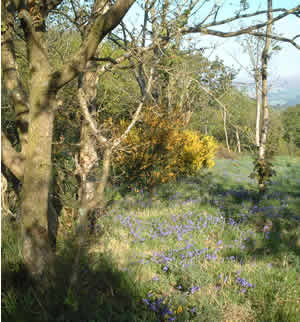
I discovered today that bos is a Dutch word for forest or wood, and this immediately made me think of the wonderful English word bosky, which is defined by the OED as “Consisting of or covered with bushes or underwood; full of thickets, bushy”.
The OED says that bosky comes from bosk, a Middle English version of bush, which like the Dutch words bos and bosje (bush), comes from the late Latin boscum / boscus (wood).
A similar-sounding English word, boss, is not related to bosky, but does come from Dutch – from baas (boss, owner), from the Middle Dutch baes, which originally meant uncle, and was first used to mean master in America during the 17th century [source].
Interesting! I’ve never heard the word bosky in English before. I am familiar with the Spanish bosque, which also means forest or wood.
For the verb to busk, http://www.etymonline.com gives the following derivation:
“The nautical term is attested from 1660s (in a general sense of “to tack, to beat to windward”), apparently from obsolete French busquer “to shift, filch, prowl,” which is related to Italian buscare “to filch, prowl,” Spanish buscar (from Old Spanish boscar), perhaps originally from bosco “wood” (see bush (n.)), with a hunting notion of “beating a wood” to flush game.”
It also suggests that the term busker comes from the nautical term.
…,busker meaning ‘itinerant entertainer’.
In Catalan, it is bosc.
Still quite close to the Latin!
I had never heard of bosky in English though.
Never heard bosky before, but now I see where french “bois” comes from!